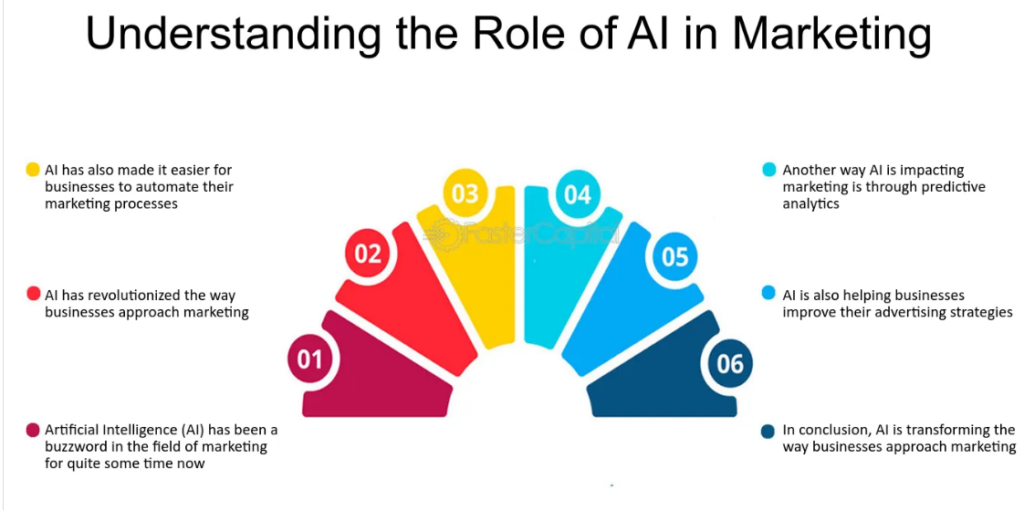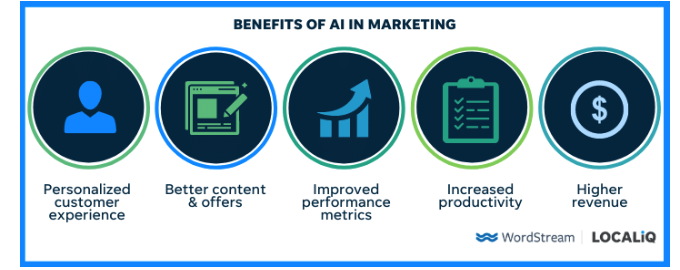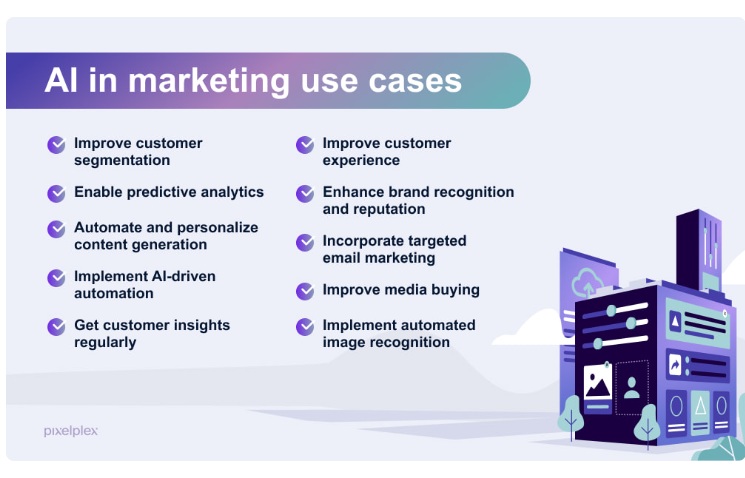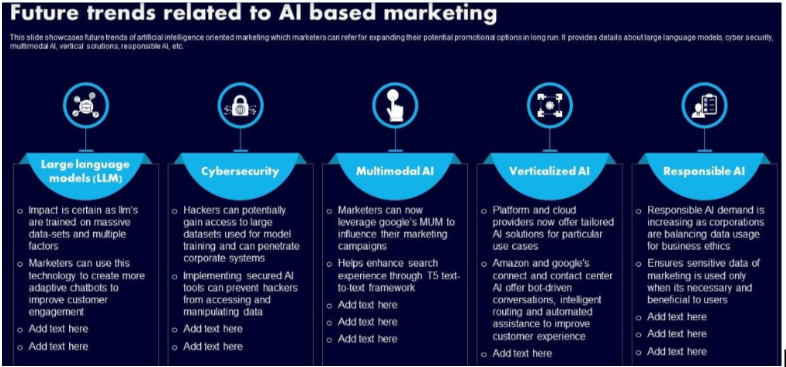In today’s fiercely competitive marketing landscape, staying ahead isn’t just an advantage—it’s a necessity. As you navigate these evolving challenges, integrating AI with the expert guidance of Flying V Group, a leader in crafting comprehensive marketing strategies that deliver true ROI, can be a game changer.
This synergy can transform how you connect with customers, streamline operations, and maximize returns.
Let’s explore practical AI in marketing examples, illustrating how businesses like yours leverage AI to outpace competition and capture market share. Get ready to see how AI can revolutionize your marketing efforts, making them more effective and responsive than ever before.
Understanding AI in Marketing
In marketing, artificial intelligence (AI) means using machine learning algorithms and data analytics to understand consumer behavior and automate complex decision-making processes. By harnessing AI, you can equip your marketing team with tools that analyze vast amounts of data more efficiently than ever, unveiling previously inaccessible insights.

The integration of AI into your marketing strategies can radically enhance efficiency. Imagine automating routine tasks like data entry, customer segmentation, and content creation, freeing your team to focus on strategy and creativity.
Additionally, AI excels in personalization—a critical success factor in today’s market. By analyzing customer data, AI can help you tailor your marketing messages and offers to match individual customers’ unique preferences and behaviors, significantly boosting engagement and conversion rates.
Moreover, the predictive power of AI in marketing cannot be understated. With advanced data analysis capabilities, AI can forecast future buying patterns and market trends, allowing you to make proactive adjustments to your marketing strategies. This ensures you remain relevant and keeps you a step ahead of the competition.
Incorporating AI into your marketing toolkit can transform your campaigns from reactive to proactive, ensuring you deliver the right message to the right audience at the right time, maximizing customer satisfaction and return on investment.
AI Use Cases in Marketing
A. Customer Insights and Personalization
AI tools excel at mining vast data to extract valuable customer insights. Using sophisticated algorithms, AI analyzes behavioral patterns to understand customer preferences and buying habits, which can be used to tailor marketing strategies effectively.
Examples of Personalized Marketing Campaigns: Many brands use AI to personalize website content, suggesting products based on browsing history. Streaming services like Netflix use AI to personalize recommendations, dramatically enhancing user experience and retention.

B. Content Creation and Management
AI’s role in content creation and management is transformative. It enables the generation of content at scale and its optimization to meet specific audience needs.
AI in Content Generation: Tools like GPT (Generative Pre-trained Transformer) produce readable text for blogs, social media posts, and advertisements.
Content Optimization and A/B Testing: AI platforms can automatically test different versions of content to determine which performs better, thereby optimizing marketing efforts.
C. Predictive Analytics
AI’s ability to predict future trends is perhaps one of its most powerful applications in marketing. By analyzing historical data, AI can forecast future consumer behaviors, enabling marketers to anticipate market needs and adjust strategies accordingly.
Case Studies: Fashion retailers use predictive analytics to determine upcoming trends and manage stock levels. Similarly, entertainment companies forecast show ratings to guide promotions.
D. Chatbots and Customer Service
AI-powered chatbots & Gen AI agents have transformed customer service, instantly responding to customer inquiries and improving engagement.
Successful Implementations:
A well-known travel site uses chatbots to handle bookings and provide travel advice.
Retailers implement chatbots on their websites to answer product questions and provide recommendations.

E. SEO and Digital Advertising
AI significantly impacts SEO and digital advertising by optimizing ads and improving search engine rankings.
Applications in SEO and Ad Targeting:
AI tools analyze search patterns to suggest SEO improvements.
In digital advertising, AI optimizes bidding strategies and ad placements for PPC campaigns, improving ad cost efficiency and effectiveness.
F. Social Media Marketing
Using AI in social media marketing helps companies understand and engage with their audience more effectively.
Tools for Social Media:
Sentiment analysis to gauge brand perception.
Trend analysis to create content that resonates with current interests.
Automated scheduling tools ensure optimal posting times for maximum engagement.
G. Email Marketing
AI enhances email marketing by personalizing content and optimizing send times to increase open rates and conversions.
AI-driven Campaign Successes:
Retailers send personalized promotional emails based on past purchase behavior.
Service providers use AI to determine the best times to send appointment reminders or promotional offers, increasing response rates.
Challenges and Considerations
While AI holds tremendous potential to revolutionize marketing, adopting these technologies comes with challenges and ethical considerations that you must navigate carefully. Ethically, using AI in marketing raises significant concerns about privacy and data security.
The collection and analysis of vast amounts of customer data—a core function of AI in marketing—must be handled with the utmost respect for privacy laws and ethical standards. As you integrate AI, ensuring transparency about data use and securing explicit consent can help build trust with your customers.
Another ethical concern involves the potential biases inherent in AI algorithms. AI systems learn from historical data, and if this data contains biases, the AI’s decisions will likely perpetuate these biases. This can lead to unfair targeting or exclusion of certain groups, impacting your brand’s reputation and effectiveness. Regularly auditing AI models for bias and ensuring diverse datasets can help mitigate these issues.
Integrating AI into existing marketing systems presents several technical and organizational challenges. The complexity of AI technology requires significant investment in skilled personnel and infrastructure.
Your team might need training to adapt to new AI tools, and finding the right talent to manage AI initiatives can be difficult. Additionally, AI integration often requires substantial upfront investment and ongoing maintenance, which can be daunting for businesses without robust IT and financial resources.
Another hurdle is organizational resistance to change. Introducing AI-driven processes can disrupt established workflows, leading to pushback from staff accustomed to traditional methods. Effective change management, including clear communication of the benefits of AI and involving team members in the transition process, is crucial to overcoming this resistance.
By addressing these ethical and technical challenges head-on, you can ensure that your AI implementations enhance your marketing strategies and align with broader organizational values and societal norms. This will help you maintain a competitive edge while upholding your commitment to ethical practices.
Future Trends and Innovations
As we look toward the future, AI is poised to further transform the marketing landscape with emerging technologies and innovations that promise to redefine how you engage with your customers and strategize your campaigns. Here’s a glimpse into what the future holds for AI in marketing:
Advanced Natural Language Processing (NLP): Future AI systems will boast more sophisticated NLP capabilities, enabling them to understand and generate human language with unprecedented accuracy. This will enhance content creation, making automated copy indistinguishable from human-written text, and improve customer interactions with more conversational and context-aware chatbots.
Augmented Reality (AR) and AI Integration: Imagine trying on clothes virtually through an AR fitting room on your website, powered by AI recommendations based on past purchases and

browsing behaviors. This integration will enhance the online shopping experience and increase conversion rates by providing a highly personalized shopping environment.
AI-Powered Visual Recognition: As visual recognition technology advances, AI can analyze images and videos at scale to gather insights about consumer behaviors and preferences. This could revolutionize product placements in videos and advertisements, ensuring they are tailored to the viewer’s interests and current context.
Predictive and Prescriptive Analytics: AI will move beyond predictive analytics to prescriptive analytics, forecasting future trends and recommending specific actions to achieve optimal outcomes. This will make your marketing strategies more proactive and data-driven, with AI suggesting the best channels, content, and campaign timing.
Ethical AI and Bias Mitigation: As awareness of AI ethics grows, technologies will emerge to address bias and ensure fairness in AI-driven decisions. This will help you maintain trust and credibility with diverse consumer bases.
Quantum Computing: Once quantum computing becomes more accessible, its integration with
Embracing AI Through Your Pathway to Revolutionary Marketing Success
The transformative potential of AI in marketing is undeniable. From personalized customer interactions to sophisticated predictive analytics, AI is reshaping how you connect with your audience and compete in a dynamic marketplace.
By integrating AI, you can unlock deeper insights, enhance operational efficiency, and precisely deliver targeted campaigns.
For those ready to embrace these advancements, Flying V Group offers expert services in crafting AI-enhanced marketing strategies that deliver true ROI. Dive into the world of AI in marketing examples and see how your business can keep pace and stand out in today’s competitive arena.
FAQs
1. What are the key benefits of using AI in marketing?
AI enhances marketing by improving data analysis, increasing personalization, and boosting operational efficiency. It allows you to understand customer preferences better and deliver tailored content, ultimately leading to higher engagement and conversion rates.
2. How can AI improve customer service?
AI-powered chatbots provide instant, 24/7 customer support. They can handle inquiries, provide personalized recommendations, and even resolve complaints, which enhances the customer experience and frees up human agents to tackle more complex issues.
3. Can AI help in predicting future market trends?
Yes, AI analyzes historical data through predictive analytics to forecast future buying patterns and market trends. This helps marketers to be proactive in their strategy planning, ensuring that they are always a step ahead of market demands and competition.
4. What role does AI play in content creation?
AI assists in generating and optimizing content across various platforms. It helps create data-driven blog posts, social media content, and personalized advertising messages, ensuring the content is relevant and engaging for the targeted audience.
5. Are there any risks involved in using AI for marketing?
While AI offers numerous advantages, it also comes with risks, such as data privacy concerns and potential biases in algorithmic decision-making. Regular auditing and diverse data sets are crucial to mitigate these risks and ensure ethical AI practices in marketing strategies.






0 Comments